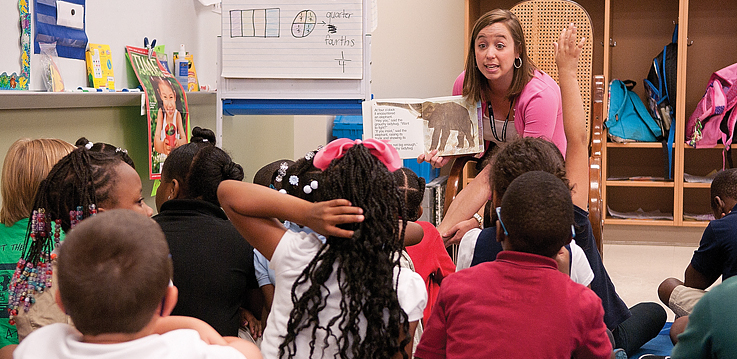Caitlin and Justin Fischetti teach because they love it, but part of what has contributed to that love is the preparation they received as N.C. Teaching Fellows. The married couple said the program gave them abundant classroom experience, as well as enrichment activities that helped them enter teaching with skill and confidence.
Caitlin, a first-grade teacher at Forest Hills Global Elementary School, and Justin, who teaches history in New Hanover High School’s Lyceum program, always knew they wanted to be teachers. But the teaching fellows program brought them more than the basic education curriculum at the University of North Carolina Wilmington.
“I feel like I got more exposure into the classroom,” said Caitlin Fischetti. She and her husband are 2010 graduates of the respected but now defunct program.
The teaching fellows were established in 1986 to encourage bright high school students to consider teaching as a career. The $5,000 scholarship covered the full cost of tuition at public universities in North Carolina, and then some. It was later raised to $6,500 to account for tuition increases.
Over the years the program has been praised for nurturing high-quality, motivated teachers.
But the General Assembly eliminated the program in 2011, and the last class graduated this month. Meanwhile, enrollment in teacher education courses has decreased by 25 percent or more in some North Carolina colleges. The trend has gotten the attention of legislators and local education officials.
The N.C. House has included in its proposed budget $3.2 million for a scholarship program similar to the teaching fellows, while the New Hanover County Board of Education is considering establishing its own scholarship program.
The Fischettis were disappointed to see the teaching fellows cut from the budget, but are heartened by the moves to fill the void. They said the teaching fellows experience provided extras that really make a difference for first-year teachers.
Caitlin Fischetti remembers a bus tour across the state that took fellows to all sorts of schools, from rural and poor urban schools to the most affluent. The experience was an eye opener. Justin Fischetti noted attentive advisers and an emphasis on personal presentation skills — including resume writing, dress and confidence-building exercises that helped land that important first job.
“It’s the experiences that make the difference,” he said.
“We were so upset when it was taken away,” Caitlin Fischetti said. “Countless people we know would not have been able to get a college degree if not for the teaching fellows.”
She will soon leave the classroom, but not the profession, to pursue her master’s degree in education.
“I can truly say I love being a teacher,” she said. “I love my kids so much. I worry about them. I pray for them. It’s everything else that makes teaching hard.”
Justin Fischetti, a graduate of Laney High School, enrolled in teacher cadet classes and attributed his choice of specialty to David Holden’s advanced placement history classes. He enjoys helping high achievers reach even higher. But he said the profession is losing good people because of low pay, as well as a feeling that politicians and the public don’t value what they do.
Fischetti still believes what he does is worthwhile, but worries that fewer students are choosing to pursue the profession.
Ken Teitelbaum, the outgoing dean of the Watson College of Education, said UNCW’s undergraduate enrollment has declined fairly significantly. As of fall 2014, undergraduate enrollment decreased by 28 percent over five years before. At the same time, graduate enrollment is up considerably, which he sees as a positive development. But those programs are for teachers already in the system.
The elimination of the teaching fellows program makes it harder to recruit top students, said New Hanover County Schools Superintendent Tim Markley. He has proposed expanding four $1,000 scholarships for students interested in teaching into a full-fledged scholarship program that would provide up to $7,000 a year to cover the cost of tuition.
In return, students would teach four years in the New Hanover County school system, or repay the money.
It’s a small gesture — the former teaching fellows program gave out 500 to 600 scholarships a year statewide in its heyday. Markley and the school board hope that local businesses will jump in and add to the number of scholarships, with the goal of strengthening New Hanover County teachers and educating the region’s future work force.
The scholarship will be highly competitive, and the goal is to pair scholars with veteran New Hanover County teachers to serve as mentors throughout their education. Like the fellows, they also would get more hands-on classroom time “so we can put them into the New Hanover County schools and they’re ready to go,” Markley said.
email [email protected]




